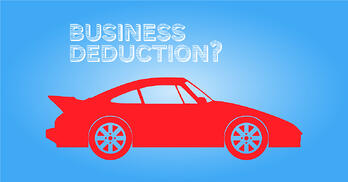 When I was an auditor working for the State of California’s Franchise Tax Board (FTB), I saw some very interesting expenses that taxpayers claimed and hoped would qualify as deductible business expenses. I have audited taxpayers who deducted personal vehicles as business expenses, personal costs as consulting expenses, or fines and penalties as dues and subscriptions (yes, parking fines are not considered business expenses). Based on the experience and the knowledge I obtained at the FTB, I would like to identify some expenses which are deductible and some which are not.
When I was an auditor working for the State of California’s Franchise Tax Board (FTB), I saw some very interesting expenses that taxpayers claimed and hoped would qualify as deductible business expenses. I have audited taxpayers who deducted personal vehicles as business expenses, personal costs as consulting expenses, or fines and penalties as dues and subscriptions (yes, parking fines are not considered business expenses). Based on the experience and the knowledge I obtained at the FTB, I would like to identify some expenses which are deductible and some which are not.
What Expenses Are Deductible?
Internal Revenue Code (IRC) Section162 allows for a business expense to be deductible as long as it is both “ordinary and necessary.” An ordinary expense is one that is “normal, usual or customary” in your industry. A necessary expense is one that is “appropriate and helpful” for your trade or business. The business expenses should be in relation to a business which is operated to make a profit.
Personal vs Business Expenses
Generally speaking, personal expenses are not deductible. However, if an expense is partially for business and partially personal, the business portion is usually deductible. For example, I came across taxpayer who claimed a deduction for a personal vehicle. Unfortunately, the taxpayer was not able to substantiate the business purpose or business use of the vehicle and therefore the expense was disallowed. The business portion would have been deductible if the taxpayer had been able to document the business portion. When determining the business portion you should be careful to have enough substantiation as the IRS or FTB both will definitely ask for it under audit.
Business Use Of Your Home
Did you know you could deduct the expenses for the business use of your home? The expenses that may be deducted include the following: mortgage interest, property taxes, insurance, utilities, repairs and depreciation. In order to qualify for this deduction, there are some requirements and tests that need to be satisfied. This article provides more information on the home office deduction.
Other Types Of Business Expenses
Other deductible expenses include: salaries and wages to employees, rent expense, interest expense, taxes and insurance. This list is not all inclusive and may differ depending on the type of industry your business is in.
What Expenses Are Not Deductible?
Fines and Penalties
Governmental fines and penalties are not deductible. The reasoning is that these fines and penalties are imposed as punishment for breaking the law and the IRS and FTB wants to mitigate this type of behavior. However, fines or penalties paid to third parties such as vendors may be deducted.
Personal Expenses
As indicated, personal expenses are not deductible.
Capital Expenses
Capital expenses are costs that are a part of your investment in your business and are considered assets in your business and need to be capitalized rather than deducted. The IRS recognizes the following three main types of capital expenses:
1. Business start up costs
2. Business assets
3. Improvements
These capitalized expenses are either amortized or depreciated over their respective lives. So they do eventually get deducted, but not necessarily in the year they are incurred.
IRC Section 179 Deduction
Does this mean that the capital expenses mentioned above are never deducted fully? Well...no. Under IRC Section 179, the IRS allows a taxpayer to deduct 100% of a capital asset under certain circumstances. For 2013, the amount allowed for IRS purposes was $500,000 per taxpayer. This amount is subject to change and is adjusted annually for inflation. However, Section 179 does come with limitations. The deduction begins to phase out dollar-for-dollar after $2,000,000 is spent by a given business on eligible assets, which means that this deduction is most beneficial to small and medium-sized businesses.
I hope this information provides you with a basic understanding of deductible business expenses. If you have any additional questions or need assistance in determining if the expense is a qualified business expense, please do not hesitate to comment below or contact us.
|
Tabish is a staff accountant at Milam, Knecht & Warner, LLP. He has a bachelor's degree in accounting from CSUN and is also enrolled in the masters in accounting program at CSUN. Before joining the team at Milam, Knecht & Warner, LLP, Tabish worked as a corporate tax intern at The Walt Disney Company and then as an auditor for California’s Franchise Tax Board. Outside of work, Tabish enjoys spending time with his family and friends, playing sports and exercising. |



